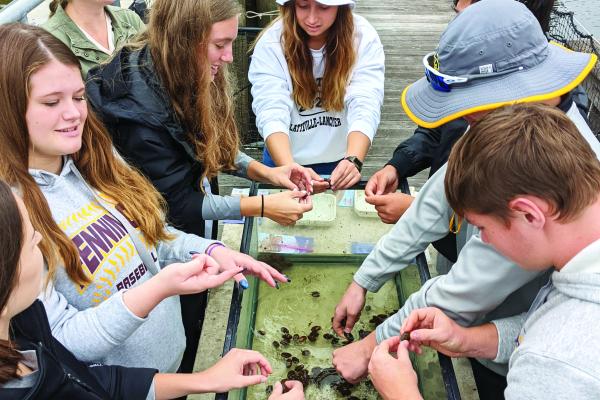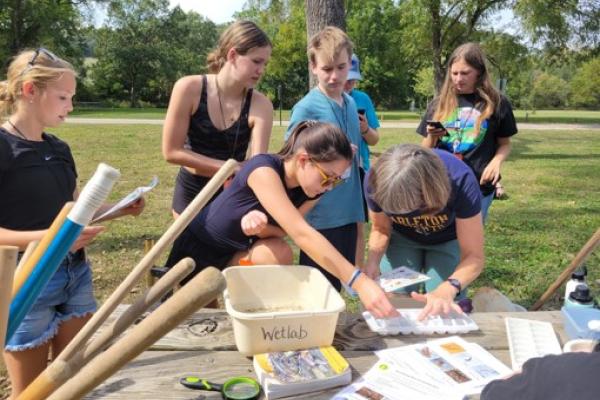Through collaboration with conservation organizations locally and across the United States, our team works to preserve and restore:
- The Mississippi River and its watershed
- Foster an awareness of and appreciation for the variety of plant and animal life in the Mississippi River and North American watersheds
- Protect threatened and endangered species
- Promote and ensure environmental sustainability through intelligent and innovative use of energy and our natural resources
The National Mississippi River Museum & Aquarium is one of only 230 worldwide zoos and aquariums accredited by the Association of Zoos & Aquariums (AZA). According to AZA "fewer than 10% of the approximately 2,800 animal exhibitors licensed by the United States Department of Agriculture are AZA accredited" and accreditation includes rigorous standards in "animal welfare, veterinary care, conservation, education, guests’ services, physical facilities, safety, staffing, finance and governing."
Making a Reservation
An inquiry form must be submitted to make a field trip reservation.
Contact our education team at 563-557-9545 x222 or learning@rivermuseum.org with questions.
Funding Resources: Mini Grant List
Conservation Education Programs
| Program | Cost Per Student | Duration | Group Size | Details |
| On-site River Ecology | $7 | 75-120 mins | Up to 30 | Includes dock and trail activities, water quality testing of the Ice Harbor, Wetland, and potentially macroinvertebrates |
| Freshwater Mussels | $9 | 75-120 min | Up to 25 | Lower dock experience; includes biology & ecosystem services focus, data collection |
| Off-campus field Trip | $135 | 90-120 mins | Up to 30 | Field trip education on relevant sites, i.e. prairie education on local prairie, wetland education at local wetland, etc. |
| In-classroom | $75 | 60 mins | One class (~30) | Aligned with state science/NGSS; custom themes (mussels, watersheds, tallgrass prairie, environmental policy, SAFE programs |
| Unit collaboration (multi-visit) | Starts at $200 | Custom | One class (~30) | Flexible multi-week collaboration includes planning, teaching, co-design (EX: Saving DBQ Unit) |
high school & college programs
On-Site River Ecology Program
Explore NMRMA’s conservation actions and onsite efforts through river-side and nature-based activities. Activities depend on season, but may include touring the conservation lab or greenhouse, protecting threatened and endangered species, invasive plant identification or removal, water quality testing, and Wetland restoration.
- Keywords: Watershed, sustainability, natural resources, stewardship,
- 75-120 minute program
- Group size: 5-30 students
- Pricing: $135/group / $7/student
High School Freshwater Mussels Dock Program
Help save the most imperiled group of animals in North American: Freshwater mussels! Participate in a recovery project alongside Conservation professionals that takes place at NMRMA. This fully immersive experience teaches students biology, ecosystem-services, career exploration, and data collection.
- Keywords: Conservation, Native v. Invasive, Saving Species from extinction, restoration, keystone species, scientific data & analysis, stewardship
- 75-120 minute program
- Group size: 5-25 students
- Pricing: $150/group / $9/student
*This is a seasonal program

Teens Take C.A.A.R.E.
When a group of teens with a shared passion for stewardship come together, they can make amazing things happen in a community. The National Mississippi River Museum and Aquarium is proud to host such a group: Teens Take C.A.A.R.E. (Conservation Action through Advocacy, Research, and Engagement). This is a student-driven, student-led program that engages teens in exploration, stewardship, and scientific inquiry through the River Museum.

Student Oceans Conference
The Student Oceans Conference is an intensive two-day watershed workshop hosted by the National Mississippi River Museum & Aquarium’s [NMRMA] Conservation and Education Departments. The conference offers hands-on learning, real-world applications, and collaboration with peers and professionals in environmental science, agriculture, and conservation.

